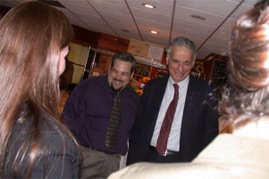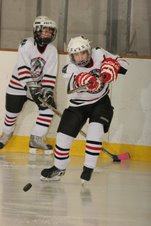Here is an open letter from Denis Kucinich to Howard Dean. Well worth a read.I would really like to believe that Howard Dean did not lie to all of his supporters just to remove Kucinich from the race. After all, Kucinich was THE Democratic Peace candidate. The more time goes on and the more Dean opens his mouth, the less I question my own unflinching support of Ralph Nader. Like many working Americans, I would have voted for Kucinich if he had been the Democratic candidate. Ralph said he would vote for Denis too and he put that in writing long before the primaries even occurred.What the Hell is Dean doing? Is there a Dean-supporter out there who didn't feel betrayed when he dropped out of the race over microphone sabotage? How could any peace advocate NOT feel betrayed by his latest remarks suggesting that we "stay on in Iraq"? Please tell me what the thinking is on this. I am truly at a loss.The way I am seeing it take shape, its becoming obvious that Dean "spoiled" the primaries for Kucinich, his only ideological opponent. When he was dealt his "defeat" (the Dean Yawp), that heralded certain victory for his two corporate opponents, Kerry and Edwards. There appears to have been some pretty good horse-trading going on behind the scenes ... Look who is now chair of the DNC ...I hope progressive Dems can explain this to me. Failing that, I hope and pray that they will wake up soon and support the growth of the progressive movement before its too late! The Democratic Party's manipulation and betrayal of its own grassroots is just unconscionable. There were many very good people in the Dean fold who fully bought in to the rhetoric and strategy and who did not deserve to have their effort cast, so casually, aside.
Matt Funiciello
Kucinich responds to Dean
An Open Letter to Howard Dean
author: Rep. Dennis J. Kucinich
The Democratic leadership should be pressing for quick withdrawal of all troops from Iraq. That's what most Democrats want, too. Your performance in the early stages of the primary, and your recent chairmanship of the party, were made possible by many, many progressive and liberal Democrats. It was their hope and expectation that you would prevent the party from repeating its past drift to the Republican-lite center. They hoped that this time the party would not abandon them or its core beliefs again.Speaking before an ACLU crowd last week in Minnesota, the home state of Paul Wellstone, the only senator to vote against the war, you were quoted as saying, "Now that we're there [in Iraq], we're there and we can't get out.... I hope the President is incredibly successful with his policy now." Did these words really come from the same man who claimed to represent the Democratic wing of the Democratic Party, and who had recently campaigned on the antiwar theme? What's changed?Perhaps you now believe that an electoral victory for Democrats in 2006 and beyond requires sweeping this war under the rug. If so, you are only the latest in a long line of recent Democratic leaders who chose a strategy of letting "no light show" between Democrats and the President on the war. Emphasize the economy, instead, they advised, in 2002 and again in 2004.Following this advice has kept us in the minority. During the 2002 election cycle, when Democrats felt they had historical precedent on their side (the President's party always loses seats in the midterm election), the Democratic leadership in Congress cut a deal with the President to bring the war resolution to a vote, and appeared with him in a Rose Garden ceremony. The "no light" strategy yielded a historic result: For the first time since Franklin Roosevelt, a President increased his majorities in both houses of Congress during a recession.The President went into the 2004 election with tremendous vulnerability on the war, which the Democratic Party again sacrificed: by avoiding the issue of withdrawal from Iraq in the party platform, omitting it from campaign speeches and deleting it from the national convention.Why does failure surely follow from sweeping the war and occupation under the rug? Because the war is one of the most potent political scandals of all time, and it has energized grassroots activity like few others.President Bush led the country into war based on false information, falsified threats and a fictitious estimate of the consequences. His war and the continuing occupation transformed Iraq into a training ground for jihadists who want to hunt Americans, and a cause cйlиbre for stoking resentment in the Muslim world. His war and occupation squandered the abundant good will felt by the world for America after our losses of September 11. He enriched his cronies at Halliburton and other private interests through the occupation. And he diverted our attention and abilities away from apprehending the masterminds of the September 11 attack; instead, we are mired in occupation. The President's war and occupation in Iraq has already cost $125 billion, nearly 1,600 American lives, more than 11,000 American casualties and the lives of tens of thousands of Iraqis. The occupation has been more costly in this regard than the war.There is no end in sight for the occupation of Iraq. The President says we will stay until we're finished. A recent report by the Congressional Research Service concluded that the United States is probably building permanent military bases in Iraq. The President refuses to consider an exit strategy. The Republican Congress gives the President whatever he asks for.We can draw no clearer distinction with the President than over this war. He cannot right a wrong (unjustified war) by perpetuating a military occupation. Military victory there is not possible. General Tommy Franks concedes that. The war will end when we say it's over. The Democratic leadership should be pressing for quick withdrawal of all troops from Iraq.That's what most Democrats want, too. Your performance in the early stages of the primary, and your recent chairmanship of the party, were made possible by many, many progressive and liberal Democrats. It was their hope and expectation that you would prevent the party from repeating its past drift to the Republican-lite center. They hoped that this time the party would not abandon them or its core beliefs again.Yet you say that you hope the President succeeds. With no pressure exerted from the leadership of the Democratic Party, the past threatens to repeat itself in 2006. We may not leave Iraq or our minority status in Washington for a long time to come.
Dennis J. Kucinich
Thursday, May 12, 2005
Subscribe to:
Post Comments (Atom)



No comments:
Post a Comment